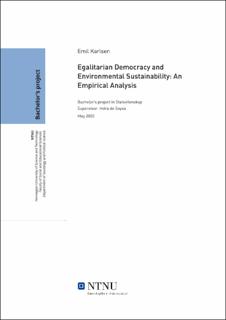Egalitarian Democracy and Environmental Sustainability: An Empirical Analysis
Bachelor thesis
Permanent lenke
https://hdl.handle.net/11250/2669179Utgivelsesdato
2020Metadata
Vis full innførselSamlinger
Sammendrag
Fasiliterer egalitære demokratier bærekraft? Ved bruk indikatorer for både egalitært demokrati og bærekraft estimerer denne oppgaven sammenhengen mellom et egalitært demokrati og bærekraftig utvikling. Den ser også på effekten av lik tilgang på utdanning og helsetjenester som ytterlige mål på likhet, uavhengig av styreform eller nivå av demokrati. Resultatene viser en signifikant, og negativ sammenheng mellom et høyere nivå av egalitært samfunn og bærekraft utvikling. Oppgaven argumenter for at dette er et resultat av den gjennomsnittlige borgerens etterspørsel etter bærekraft, da et egalitært samfunn i seg selv ikke nødvendigvis skaper bærekraft, men fasiliterer etterspørselen til sine innbyggere. Deretter ser på hvordan etterspørsel for bærekraft formes, og hvordan egalitære demokratier kan fasilitere gode holdninger til miljøet. Using relevant measures of both sustainability and egalitarian democracy from the World Bank and the Varieties of Democracy (VDEM) datasets, this thesis estimates the relationship between egalitarian democracy, in the form of the egalitarian democracy index, and sustainability, in the form of the adjusted net savings. Additionally, it isolates and estimates the relationship between sustainability and equality of access to health and education, as additional measures of equality. The results clearly show a negative correlation between egalitarian democracy and sustainability measures. This does not necessarily imply that democratic inclusiveness is bad for the environment, but as this thesis argues, that people lack demand for environmental protection, as egalitarian democracy does not inherently cause sustainability; it empowers people to shape the rules and policy governing their society. Demand for environmental policy thus has to be positive for egalitarian democracies to produce sustainability. The negative correlation between egalitarian democracy and the adjusted net savings rate indicates they do not. It then looks at how demand for sustainability can be facilitated by an egalitarian democracy.
